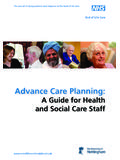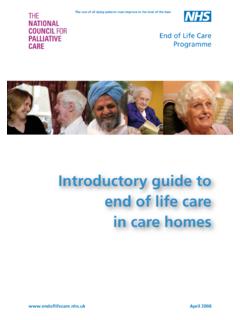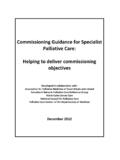Transcription of What to expect when someone important to you is …
1 A guide for carers, families and friends of dying peopleWhat to expect when someone important to you is dying2If you are caring for someone who is in the last stages of life, or who may be soon, this booklet is for is designed to help prepare you for what to expect in the very last days and hours of a person s will help to answer three questions that you may have already asked, or are likely to ask at some point:About this booklet1. What happens when someone is dying ? (page 3)2. What kind of care can a dying person expect to receive, and what kind of support can I, as someone important to the dying person, expect to receive?
2 (page 11)3. Where can I turn for help if I am concerned about someone who is dying ? (page 17)This booklet covers the main things you should know on these questions, and aims to point you in the right final days of life are precious days, often remembered in detail by those who live on, and the priority is to ensure a peaceful and comfortable death with the right level of support for you and the person you are caring and emotions in the final days are often similar whatever the underlying illness whether it is cancer, heart disease, lung disease or any other chronic you have been involved in care up until the final days.
3 Then you may want to stay involved or you may want to step back and let others perform the physical care. You are part of the caring team and your voice should always be heard, and decisions may wonder what the dying process involves what actually happens in the very last days and hours of a person s life?This process is unique to every single person. It is not always possible to: know for sure that a person is in the last days of life predict exactly when a person will die know exactly what changes the person you are caring for will experience when they are dyingThere are certain bodily changes that signify a person is likely to be close to death.
4 It is normal for these signs to come and go over a period of days, and if they do go, this does not usually mean that the person is of these changes may be distressing, but the information below may reassure you that many of these changes are not unusual, and suggest how you can help or seek guidance. As a carer, if any of these signs do start to overwhelm or distress you, you may wish to take a break and leave the bedside for a period. It s important to think about your own feelings as well as those of the person you are caring happens when someone is dying ?4 Signs that a person may be dyingShould I be worried?
5 Is there anything I can do to help?The person s appetite is likely to be very may no longer wish to eat or drink anything. This could be because they find the effort of eating or drinking to be too much. But it may also be because they have little or no need or desire for food or drink. Eventually, the person will stop eating and drinking, and will not be able to swallow a person stops eating or drinking because of their reduced appetite, this may be hard to accept, but it is a normal part of the dying process. If they stop drinking, their mouth may look dry, but this does not always mean they are is normal for all dying people eventually to stop eating and the person is conscious and they want something to eat or drink, you can offer sips, provided they can still swallow.
6 You can give some comfort to a person with a dry mouth by: offering a drink through a straw (or from a teaspoon or syringe) moistening the mouth with a damp sponge special kinds of sponge are available for this purpose (the person may bite on this at first, but keep holding it, as they will let go) placing ice chips in the mouth applying lip balmChanges in the last days of life5 Signs that a person may be dyingShould I be worried?Is there anything I can do to help?The person s breathing may a person s body becomes less active in the final stages of life, they need less oxygen, and their breathing may become shallower.
7 There may be long pauses between their the person s breathing may also make a noise, commonly known as death rattle . This is likely to be because they are not able to re-absorb or swallow the normal fluids in their chest or throat, which can cause a rattling the very last moments of life, the person s breathing pattern may change. Breaths may become much slower and quieter before they stop change in the breathing pattern is a normal part of the dying process. If the person is anxious, their breath rate may increase a rattling sound may be upsetting to hear, but it does not seem to cause any distress to the dying person.
8 It can be a bit like snoring which affects those who hear it more than the person who is making the person does not usually need extra oxygen at this the person is anxious, sitting with them so that they know you are there may help to reduce their anxiety. Breathlessness can be frightening - a small fan and an open window can the breathing is very rattly, it may be helpful to change the person s position so that they are on their side if they agree or do not seem too disturbed by being moved. You can ask to be shown the best way to move the person ask about sliding doctor or nurse may also suggest medication which may help to reduce the fluids in their chest and throat.
9 This is not always needed, and it does not always make a that a person may be dyingShould I be worried?Is there anything I can do to help?The person may become much person is likely to spend more time sleeping, and will often be drowsy even when they are may also drift in and out of consciousness. Some people become completely unconscious for a period of time before they die - this could be short, or as long as several days. It is normal for a dying person to sleep more. They may generally become less interested in what is going on around them, and have less energy to take part, but this does not necessarily mean they are no longer hearing what you say to is important to remember that, even when the person is or appears to be sleeping or resting, they may still be able to hear you.
10 Do not feel that you need to stop communicating with the person. You might want to carry on speaking quietly and calmly to could also try letting them know you are there in other ways. For instance: holding their hand, reading to them, or playing their favourite that a person may be dyingShould I be worried?Is there anything I can do to help?The person s skin may feel cold and change person s hands, feet, ears and nose may feel cold to the touch (this is due to reduced circulation). Occasionally, a person s hands or other parts of the body may swell a skin may also become mottled and blue or patchy and uneven in changes are all normal parts of the dying process.

















